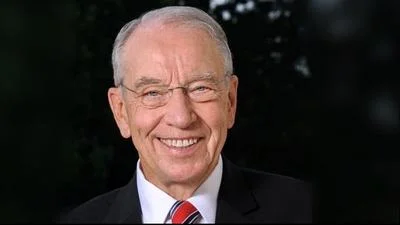The publication is reproduced in full below:
Labor Day
Mr. BROWN. Madam President, earlier this week, we celebrated Labor Day, a day when Americans come together to honor the people who make this country work.
Whether you punch a clock, whether you swipe a badge, whether you earn a salary, whether you make tips, whether you are caring for children or an aging parent, all labor has dignity. When work has dignity, hard work pays off for everyone, no matter who you are, where you live, what kind of work you do. Yet we know that for so many Americans, their work simply doesn't pay off like it should.
Look at what has happened in Minnesota, Ohio, and Rhode Island--and I know Senator Grassley is coming out--and in Iowa. Look what has happened over the last 30, 40 years. Executive salaries have soared. CEO pay is up 1,300 percent since 1978--1,300 percent. Corporate profits have risen. Stock prices are up. Workers are more productive than ever before. But for decades--for decades--wages barely budged for most Americans. Their purchasing power has largely been flat for some five decades because Wall Street rewards corporations that raise prices without raising paychecks. Wall Street rewards stock buybacks. Wall Street rewards union busting. Wall Street really rewards shipping jobs overseas. Wall Street rewards automating jobs. Wall Street rewards outsourcing full-time, in-house work to contractors.
Wall Street analysts actually downgrade stock prices when American companies invest in American workers, in American production. If a company owns a new factory in Ohio, Wall Street might often downgrade its stock. If that same company instead buys back its own stock, sending 40 percent of the returns to foreign investors, Wall Street rewards it.
We work to change that. For the first time in far too long, we have a government on the side of workers. We have a dues-paying union member as Labor Secretary.
Contrast this Labor Secretary--a laborers' union activist who carried a union card before he came; I think he still does as Secretary of Labor--contrast that with the Trump Secretary of Labor, who worked for one of the major world leaders in union busting and who made millions of dollars a year by busting unions.
We took on Big Oil--I am sorry. We have a National Labor Relations Board actually looking out for workers and willing to go after union busting. We passed the most pro-worker infrastructure bill ever, the strongest ``buy American'' provisions ever in a piece of legislation. We have taken historic steps to put workers first, to invest in American workers, to make our economy work for every American, not just CEOs and not just Wall Street.
That is what you came to the Senate from Minnesota for, and that is what Senator Whitehouse came from Rhode Island for--to make these fights.
We passed the CHIPS Act to bring our supply chains home, to bring down prices for American families, and to create thousands--tens of thousands of good-paying union jobs in Ohio and across the country.
This groundbreaking that President Biden and I and Congressman Ryan and others are going to do this Friday in Licking County, OH, will mean, at a minimum, 5,000 good-paid, union, building trades jobs--
carpenters, electricians, pipefitters, laborers, ultimately millwrights, so many others--at least 5,000 over the next 2 or 3 years that will last at least for 10 years.
Passing the CHIPS Act brings our supply chains home to bring down prices for American families. We passed the Inflation Reduction Act, taking on three of the most powerful special interests in Washington. We took on the big drug companies, Big Pharma, to bring down drug prices. We took on Big Oil to lower energy prices and create jobs, union jobs, in the industries of the future. We took on Wall Street, finally taxing stock buybacks that reward CEOs and executives at the expense--always at the expense--of workers and jobs.
These are big wins for workers--together, the biggest steps we have taken in decades to create an industrial policy that puts our most valuable resource--American workers--first. It counters the business model where corporations hopscotch the globe in search of lower wages and lower wages and lower wages.
From the infrastructure bill, the CHIPS Act, the Inflation Reduction Act, we have laid down a new marker. The technology of the future, from semiconductors to batteries, to electric vehicles, will be developed in America, made in America by American workers.
It hasn't been easy. Our work is far from finished, but I am optimistic. I see more momentum behind the labor movement than at any time in my career. All over the country, more and more workers are seeing that unions are the best way to have a voice, from Starbucks to Amazon. Seventy percent of Americans--I don't ever remember it being that high--70 percent of Americans approve of unions; for sure, the highest level of support in 50 years.
More people than ever want to join a union. They know that carrying a union card means higher wages. It means better benefits. It means better working conditions. It means more control--particularly for young families or families taking care of an aging parent--more control over your schedule.
We know what workers are up against when they organize. Corporations unleash all their power to fight their own workers--too often, illegally. It is why I will never stop fighting to pass the PRO Act to finally level the playing field between workers and corporations in union organizing.
This week, we honor the workers who built this country. We recommit ourselves to the fights ahead because when work has dignity, every American is paid the living wage they have earned. When workers have dignity, all workers can afford childcare and healthcare and housing. When workers have dignity, American workers have retirement security and paid leave and power over their schedules and their lives--because when you love this country, you fight every day for the people who make it work. That is what the labor movement has done for a century; it is what I will continue to do.
SOURCE: Congressional Record Vol. 168, No. 143
The Congressional Record is a unique source of public documentation. It started in 1873, documenting nearly all the major and minor policies being discussed and debated.
Senators' salaries are historically higher than the median US income.




 Alerts Sign-up
Alerts Sign-up